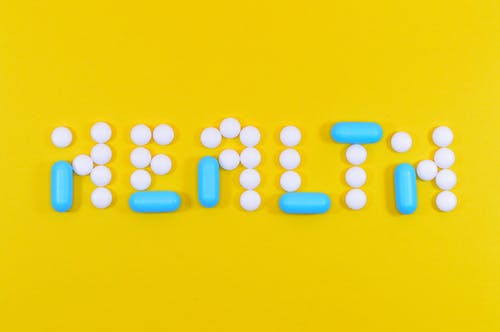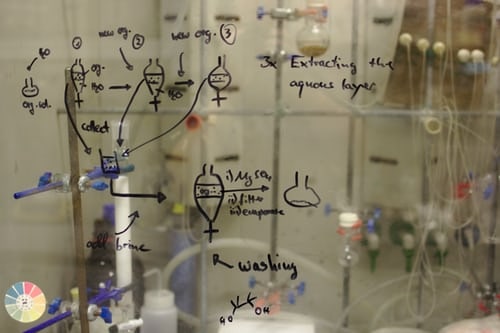We all know vitamins and minerals are good for us but does taking more in the form of pills and potions (aka supplements) really give you a health boost?
If you’re interested to find out now’s your chance because in this to the point post, we take a look at 5 compelling reasons you may want to rethink your autopilot supplement habit. First, a fast intro to what even are vitamins and minerals and why we need them in the first place.
What Are Vitamins and Minerals?

Vitamins and minerals are substances your body needs in order to continue carrying out the innumerable functions and processes which keep you alive all the way down at the level of subcellular.
As humans there’s a bunch of these substances (13 essential vitamins and 16 essential minerals to be precise) which we don’t make and therefore need to get from outside sources (aka food).
To give an example of the importance of just one vitamin in your body we’ll take the well-known vitamin C. Vitamin C is necessary for the production of collagen a connective tissue you’re likely familiar with for its role in keeping your skin supple but vitamin C also has many other roles including acting as an important antioxidant, helping to keep you healthy and your immune system functioning as well as in the production of some neurotransmitters. You’ve probably heard of the disease scurvy as something sailors used to suffer from back in the day when they’d spend years at sea with no fresh produce because vitamin C is high in fresh fruits, vegetables and liver. All the horrible symptoms of this illness including bleeding gums, tooth loss, fatigue, bruising, weight loss and eventually death are all caused by a vitamin C deficiency. Therefore, knowing these symptoms come from a deficiency in just one of 13 vitamins (not to mention another 16 minerals) gives you a glimpse of just how important it is to meet all your vitamin and mineral needs!
Fun fact:
Most animals (including your house kitty) make their own vitamin C. That is, they don’t need to eat it which is pretty cool!

What Is A Supplement?

A supplement is the isolated form of a particular nutrient or a few nutrients which has/have either been extracted from a food or artificially manufactured.
Here we’re talking vitamin and mineral supplements (so your classic multivitamin, hair, skin and nails mix or individual vitamins such as vitamin E or vitamin C) but this may also include nutrients such as protein, omega fatty acids or fibre supplements.
Why Would You Want to Take A Supplement?

The logic behind supplementation is fairly straightforward in that if we need this or that vitamin or mineral in order to be healthy then isolating it and providing it in a pill, liquid or other ingestible form would theoretically also be beneficial, more convenient and allow for specific “therapeutic” doses.
So, now you know what vitamin and minerals are, why they are important, what a supplement is and the theory behind their production and use now let’s take a look at 3 things to consider before self-prescribing.
5 Quick Reasons Why You May Want to Rethink Your (Health) Pill Popping
- You Eat Well

We were made to get all our nutritional needs met though foods therefore there’s no reason this isn’t possible today with the abundance of food choices many of us have access to. If you eat an adequate and varied diet it’s pretty unlikely you need any supplementation because while meeting your vitamin and mineral needs is irrefutably important studies indicate going above and beyond your bodies needs does not provide any additional health boosting benefits and in some cases can actually be equally or even more harmful as a deficiency (which we’ll touch on in point 3).
2. Out of The Frying Pan and Into the Flames – It May Be Interfering with Your Absorption of Other Nutrients

When you eat wholefoods the mix of micronutrients and other compounds within the foods appear to work in synergism. A synergism you simply can’t get from a vitamin pill.
When you take extracted or human made forms of concentrated vitamins or minerals, they can interfere with your body’s absorption of other nutrients. For example, the mineral calcium is known to inhibit iron absorption and if you are taking a calcium supplement with meals (as is advised for some forms of calcium supplements) containing iron there’s obviously the potential for iron deficiency to develop over time.
Therefore, I always encourage my clients to go with the principal of “food first”. This is simple in principal and simply means eating foods as your first means of meeting your nutritional needs (for more information on what exactly food first means and how to do it well click to read my earlier post where I covered this as part of the topic of What Is “Healthy Eating” Anyway?).
3. Too Much of a Good Thing – Toxic Effects of Vitamin and Minerals

Clearly the evidence is entirely conclusive that getting too little of any micronutrient is harmful but on the flip side of this so is getting too much.
Supplements offer a means of ingesting an amount of vitamin x or mineral y far above what is found in a food or combination of foods we’d eat in their natural form. There are many vitamins and minerals where getting high doses either over time or in one go can cause symptoms such as hair loss (selenium), diarrhoea (magnesium), constipation (iron), blurred vision (vitamin E), nerve damage (vitamin B6), liver damage (vitamin B3 and vitamin A), increase risk of developing cancer (for example folate) and even death (for example iron toxicity).
4. Good Nutrition Is So Much More Than an Individual Nutrient

Wholefoods (i.e. foods which are in their whole form for example an orange versus vitamin C powder isolated from an orange) contain many other health promoting substances beyond vitamins and minerals.
Wholefoods contain the 3 macronutrients (protein, fat and carbs), phytochemicals, antioxidants and fibre as well as many more compounds I am sure we are yet to discover or yet to pinpoint exactly why it is that they are good for us. Don’t miss out on the other great things in foods just because a supplement says this one vitamin or mineral is important because we certainly don’t know it all when it comes to the science of nutrition!
5. You Don’t Know What You’re Getting

Also, of important note and reason to rethink your desire to boost your health through supplements is the fact that supplements are not regulated in the same way that pharmaceutical drugs are.
Medications go through a pretty rigorous series of tests before the Government will approve them to enter the market for human use whereas supplements are not subject to the same regulations (by the food and drug administration or FDA).
There have been cases of supplements not containing what they are claimed to contain, containing what they are claimed to contain at doses far below or far above what they say or containing harmful substances alongside the vitamin or mineral you think you’re purchasing. In other words, while the vitamin or mineral you’re interested in for health benefits may indeed have health benefits there are no guarantees that what you are buying is even giving you what you want in the first instance.
Why You Still May Want to Consider A Supplement

While conclusive evidence that supplementation provides any additional health boost for those already eating a healthy and well-balanced diet may be lacking what isn’t lacking is evidence that deficiencies are devastating to healthy functioning.
For example a deficiency in vitamin B12 causes lethargy, irritability, short attention and if severe brain damage, a deficiency in calcium causes osteoporosis clearly the effects of deficiency in any one of the essential vitamins and minerals alone or in combination has profound effects on our health, capabilities and certainly enjoyment of life. Which means it is important to meet your micronutrient needs and to rule out the possibility that you may not be would be ridiculous. Without knowing anything about you it would essentially be useless for me or anyone else to give a blanket recommendation to supplement or not to supplement.
We are all different in our needs, our bodies ability to digest, absorb, process and make use of the micronutrients we eat in foods which means if you suspect you may be deficient, have signs or symptoms that are less than what you desire for your health or have a history of suboptimal food intake I’d highly encourage you to get in touch with me or talk with a dietitian. A dietitian will help you assess your food intake in light of your specific needs as a unique one of a kind human being (which is what you are) and help you with practical ways of getting your needs met and if necessary what blood tests to ask your GP for. There literally may be a very simple thing which could make all the difference to your health and enjoyment of life so it’s worth finding out.
Take Home Points

As a human being you need to eat a wide variety of vitamins and minerals daily. This is essential and non-negotiable to survival let alone thriving.
As a human being your body is designed to get these vitamins and minerals from food. In other words, you cannot make up for eating a poor diet through taking a supplement.
Just as there are definite detrimental effects of vitamin and mineral deficiencies there are also risks associated with too high an intake and supplements offer a means of far exceeding what would be possible in a natural state (i.e through foods).
The moral of the story is the same as with any other health advice – don’t just go on autopilot and take this or that because you heard from someone who heard from someone who heard from someone that it may make your hair shinier or prevent cancer because without an assessment of your needs it’s impossible to determine if it will be good, bad or neutral for you. What is great for another may be damaging and at best useless for you.
It’s easy to be blasé or even overwhelmed by all the nutrition information out there because the truth is it is a very complex area of expertise, but complex does not mean impossible. You’ll be eating for the rest of your life and because what you eat or don’t eat affects your body 24 hours a day 7 days a week I can’t really think of a more meaningful area of your life to be informed on and take charge of. Please don’t let complexity or loud opinions prevent you from getting the treatment you need because the outcomes from doing so may be profound.
If after reading this, you are still unsure if you are meeting your body’s needs for what you want to achieve in your health and happiness then get in touch with me and we can sort it out by getting clear, congruent and on track with your goals.
With my whole heart I trust you found this information useful and inspiring

Become Great. Live Great.
Bonnie.



